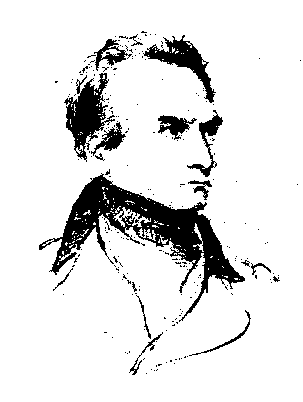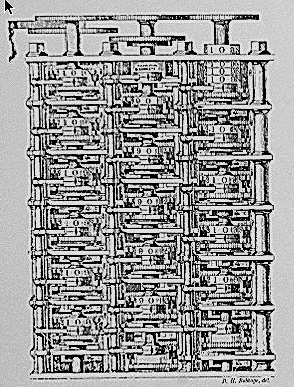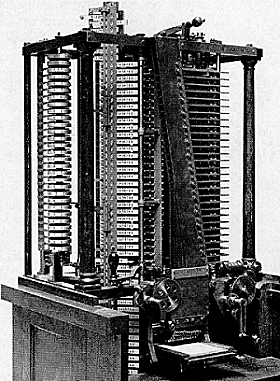
Charles Babbage is better known as the "Father of Computing" because of his contributions to the basic design of the computer through his Analytical Engine. He was born into a wealthy family on December 26, 1791 in Devonshire, England and died in 1871 in London. When Charles Babbage passed few people knew who he was. No obituary was printed by the Royal Society and he was ridiculed by the Times. After being preserved for 37 years in alcohol, in 1908, Babbage's brain was dissected by Sir Victor Horsley of the Royal Society. This was done to remind society that Babbage was a profound thinker. Not only was charles Babbage known for his Difference Engine and the Analytical Engine but he also invented the cowcatcher, dynamometer, standard railroad gauge, uniform postal rates, occulting lights for lighthouses, Greenwich time signals and heliograph opthalmoscope.
�
Babbage was not a healthy child and was frequently sick with fevers. At a young age Babbage was already showing signs of great intelligence and creativity. He made shoes for walking on water and tied bookcovers to his feet that would open when he put his foot down. He loved algebra and read most of the standard and some non-standard texts by the time he went to Cambridge University.
�
In 1814 Babbage married and left Cambridge in 1815 for London. In 1816 he was elected a fellow of the Royal Society and played a major role in the foundation of the Astronomical Society in 1820. From 1828-1839 he played an important role in the establishment of the association for the advancement of science and the Statistical Society.
In 1819, Babbage's interests were turning towards astronomical instruments and he formulated a plan to construct tables using the method of differences by mechanical means. This is when he began work on the Difference Engine which could perform simple mathematical calculations up to twenty decimal places. While working on this engine, Babbage started developing plans for a bigger and better machine-The Difference Engine 2. He received government funding for the project and began working on it immediately. He worked on this for several years until problems arose over the ownership of tools and the machine as well as the location of the workshop. This caused the work to come to a halt in 1834 and it never got finished. Babbage did however receive a gold medal in 1823 from the Astronomical Society for his development of the Difference Engine.
� � �

His work on the Difference Engine 2 led him to a much more sophisticated idea which became known as the Analytical Engine. The first drawings of the Analytical Engine were completed by 1834. It was a massive brass steam powered, general purpose, mechanical computer the size of a locomotive. The drawings are the forerunner of the modern electronic computer and the logical components are similar to today's computer in that they have the store, the mill, the control, the input and the output. The store contains all the variables to be operated upon and was to hold 1000 numbers each of 50 digits, but Babbage designed the analytical engine to have infinite storage. This was achieved by outputting data to punch cards which could be read again later. The mill is the place which the quantities about to be operated upon are always bought. The control was to be carried out by a Jacquard loom type device that was operated by punched cards. The punch cards contained the program for the particular task. When all said and done, the Analytical Engine would be like a library of its own. Every set of cards once made will at any time reproduce the calculations for which it was first arranged.

�
Babbage worked on the Analytical Engine until he passed away but unfortunately due to lack of funding the engine was never completed and people say he died a bitter man because of it. His ideas were forgotten when he died and his unpublished notes were discovered in 1937. In 1991, following Babbage's notes, the Difference Engine 2 was built. It was accurate to thirty one decimal points. Mathematics has changed due to the construction of modern computers, and you may even say the whole world, due to Babbage's Analytical Engine. � �
� � �
� � �
References:
Hyman, Anthony. "Charles Babbage: Pioneer of the Computer". Princeton, NJ. Princeton University Press, 1982.
http://www.fourmilab.ch/babbage/
http://www.maxmon.com/1830ad.htm
http://www.bbc.co.uk/history/historic_figures/babbage_charles.shtml
http://burks.brighton.ac.uk/burks/foldoc/5/19.htm

web hosting ? domain names
Powered by Ampira